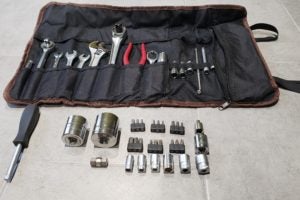As Mike shared this morning, May is Motorcycle Safety Awareness Month, as promoted by industry organizations in the US and Canada.
Around the world, a lot of countries have this idea, a month at the start of riding season to remind motorists to watch for bikers (in Australia, they have a similar idea in the fall). I think it’s a good thing, but to be clear, I think there are some obvious things that would make car drivers more cautious towards motorcyclists, and I see zero initiative from government or industry to make these ideas happen.
For starters, we need more accountability for car drivers who cause motorcycle accidents. We’ve all seen too many headlines about car drivers who maim or kill motorcyclists, and then walk away with minimal punishment, despite egregious misconduct. This needs to change.
We also need better enforcement of impaired driving laws. This is tied very closely to the first point. For decades, drunk drivers were one of the biggest dangers to motorcyclists. Now, we can add cannabis-impaired drivers to the mix as well. Police officers I’ve talked to simply throw up their hands and say they can’t make the cases stick in court, so they’re not interested in chasing the issue just to have a judge throw it out. This needs to change.
Third, we need to make it easier to get small-bore bikes on the road, therefore creating more motorcyclists. This would raise awareness through sheer numbers, and also make more car drivers cautious since it could be there wife/mother/husband/father/child/nephew/etc. out there on that little motorcycle or scooter. I think I’ll say more on this in a future column.

Unfortunately, we ourselves are unable to do much about big picture problems. That means we need to focus harder on the things we can impact, our own behaviors and equipment. Photo: Creative Travel Projects/Shutterstock.com
But for you and me, there’s little we can do to effect these changes, aside from pressuring local politicians and asking the AMA/CMA/etc. to apply their own leverage. All we can do is watch out for ourselves, and constantly learn from our mistakes, near-misses, and most importantly—the advice of others. It’s much better to apply advice that others learned the hard way than to learn it yourself by the same method.
With that in mind, here are five suggestions I’ve used to stay out of trouble through the years. They’re in no particular order.

A helmet communicator can be a very useful tool, allowing your riding group to warn each other about upcoming hazards. Photo: kajeab_pongsiri/Shutterstock.com
1). If you’re group-riding, get your crew on helmet comms. If everyone is linked via Sena/Cardo/etc., you can warn about oncoming traffic, road debris, fast-approaching cars from the rear, upcoming turns, etc. I know that comms can also be a distraction, but the benefits outweigh the drawbacks.

Can that car see you, as you approach from the rear for an overtake, or will the driver also pull out for a pass, cutting you off? Be ready to change your lane position based not just on hazards like potholes, but also your movement through traffic and the behavior of that traffic around you. Photo: FTiare/Shutterstock.com
2). Use your whole lane, all the time. I’m not saying you should be zig-zagging back and forth all the time; you should ride predictably. But when you’re passing traffic, it doesn’t hurt to change your lane position slightly, giving yourself a safety cushion in case they make a sudden lane change, or something flies off their vehicle, or whatever. Don’t trust cagers to do the right and sensible thing, ever.
Watch what’s going on all around you at an intersection, including behind you. A stoned, texting driver may not see you ahead of them until it’s too late. Photo: vtwinpixel/Shutterstock.com
3). On that same note: Approach intersections with the same caution that you’d use for a trapped bear. Are you sure that blue-haired granny in the opposite lane saw you? Are you sure the harried mom in a minivan full of kids didn’t forget to turn her signal light on? Are you sure the kid in the hopped-up Civic isn’t going to cut you off, even though he knows you’re there? I’ve had riding partners who made fun of me for not pushing my luck at intersections, and maybe they’re right, maybe I’m too cautious. But if my intuition and real-time observation don’t tell me I’m good to go, I’m very, very cautious at stop signs and lights.

Fog makes the road slippery and doesn’t run off like rain does, while also reducing visibility and soaking your riding gear. Know about the local road and weather hazards that are common to your area. Photo: XDs2/Shutterstock.com
4). Know the hazards specific to your area. No official nation-wide safety course can tell you that the service station down the road always has a diesel spill out front, or that the driveways along that hilly back road will always wash out in a heavy rainstorm, leaving gravel across the road. They don’t know that your daily commute involves a cable ferry with a deck that’s slippery in the rain. They don’t know about the farmer who leaves slick mud across the lane when he drive his tractor out of the pastures along your favorite Saturday ride. They don’t know that the coastline you ride is often foggy, reducing visibility to near-zero and soaking you to the skin on an otherwise balmy summer night. Spend time with experienced motorcyclists from your area and learn this stuff for yourself.

Got a riding buddy that runs too close behind you? Address bad behavior before it causes a real problem. Photo: GROGL/Shutterstock.com
5). Kindly, but firmly hold your friends accountable for dumb decisions. I think all motorcyclists are guilty of the occasional bad pass or something else that elevates their risk level for no good reason. Maybe that’s your jam because you’re a single guy with a Born to Die tattoo across your chest; but if you and your buddies have families you want to return to, you should point out this sort of thing when it happens. Don’t be a jerk about it, and don’t embarrass them, but if someone does something that’s truly dumb, try to make sure it doesn’t happen again. Think I’m being overly preachy? Read Tim Mayhew’s story of his stroke that happened while leading a motorcycle tour. Thankfully, his friends’ caution saved his life when they essentially mutinied and took him off the road following a minor crash… but the incident could have been prevented if he’d listened to them earlier in the tour. I’m not saying that Mayhew made a mistake on that trip, I’m saying that his friends made the right call by intervening. That sort of incident is rare, but paying attention to your riding buddies and holding each other accountable can prevent tragedy.
I could go on at length, but I’m curious to hear your thoughts and advice on safety. What little things do you do, to keep yourself and your riding buddies safe along the trails and streets? Share below!







